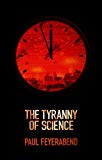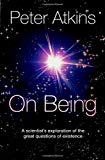Books Reviewed
A review of On Being: A Scientist's Exploration of the Great Questions of Existence , by Peter Atkins
, by Peter Atkins
and The Tyranny of Science , by Paul Feyerabend
, by Paul Feyerabend
Scientism is the view that all real knowledge is scientific knowledge—that there is no reliably objective, rational form of inquiry that is not a branch of science. It is a key ingredient of the work of New Atheist writers like Richard Dawkins and the late Christopher Hitchens, and its proponents dismiss philosophy's and theology's claims to provide distinctive but equally rational and objective avenues to truth. But the view faces a notorious problem: scientism is not itself a scientific thesis, but a metaphysical one. Hence it is either self-defeating, or implies so broad a construal of what is allowed to count as "science" that the claim that all real knowledge is scientific knowledge becomes trivial.
Convinced that non-scientific modes of inquiry are not worth investigating, proponents of scientism tend to know very little about the actual arguments of the philosophers and theologians whose work they dismiss, and are rarely conscious of the philosophical difficulties inherent in their own position. Consequently, their arguments typically reduce to a circle of mutually reinforcing prejudices. They "know" that science alone provides genuine knowledge because purported alternatives do not rest on methods of the sort applied in physics, chemistry, and biology; and they "know" that those methods alone are rational because they are the only ones utilized by science.
Chemist Peter Atkins's disappointing new book On Being manifests all of these weaknesses, and fails even to convey much of the grandeur of the science he (rightly) esteems. Ostensibly its aim is to present "a powerful declaration of the atheist scientist's view," and in particular to show how science—and science alone—provides rationally grounded answers to the questions raised by philosophy and religion. In fact it is little more than a jumble of platitudes, begged questions, undefended assertions, and dyspeptic attacks on straw men, peppered here and there with some disconnected bits of scientific trivia.
"The scientific method," Atkins boldly proclaims, "is the only means of discovering the nature of reality." But how does he know this? Does the scientific method itself tell him? Then the result is a circular argument. Does he know it by some other method, then? In that case there is some reliable but non-scientific method after all. If there is a way out of this dilemma, Atkins does not tell us what it is. Indeed, he seems completely unaware that there is any problem here in the first place, though it is well-known to philosophers.
And what exactly is the "scientific method"? Atkins tells us that it involves "making observations and comparing notes." This is so vague that there are vast systems of metaphysics—for example, the theism of prominent contemporary philosophers of religion like Richard Swinburne and William Lane Craig, or the more ancient systems of Aristotle and Thomas Aquinas—that are perfectly compatible with it, insofar as they claim empirical foundations and put a premium on the give and take of critical philosophical debate. Yet Atkins would presumably not wish to count Swinburne's, Craig's, Aristotle's, or Aquinas's arguments for the existence of God as "scientific." Perhaps he would answer that these are scientific theories, but refuted ones. Yet Swinburne, Craig, and contemporary Aristotelians and Thomists would obviously disagree. So how would Atkins respond to their arguments? We do not know, because he does not even acknowledge their existence, much less answer them.
* * *
Nor does he tell us how he would respond to rationalist philosophers who hold that there is genuine knowledge that is not grounded in observation; or to Platonist arguments for the existence of a realm of numbers and other abstract objects, distinct from either the material world or the human mind; or to Cartesian and other dualist arguments for the non-material character of the mind; or to the great variety of other contemporary philosophical arguments—put forward by prominent secularists as well as those sympathetic to religion—to the effect that materialism, naturalism, and scientism are seriously problematic and fail to do justice to what we know about the nature of human thought and action, moral value, and indeed the practice of science itself. These sophisticated philosophical challenges, though well known to (and paid attention by) naturalists and secularists within academic philosophy, are simply ignored by Atkins. He directs his fire only at easy targets—Creationists, Rapture enthusiasts, and other bogeymen—and pretends that those who disagree with him have on their side only faith and wishful thinking rather than rational arguments.
The irony is that Atkins also repeatedly acknowledges that his own commitment to scientific method ultimately rests on "faith"—his own word—and occasionally hints vaguely that he realizes that there are philosophical issues raised by his position that he does not pretend to have answered. When it serves his purposes, he commends precision in thought and language, rightly dismissing those who would characterize this as pedantry with the quip: "So? Science is all about pedantry." Yet just a few pages later—where greater precision over the notoriously problematic concept of "species" might get him into trouble—he suddenly warns that insisting on "rigid" definitions would "freeze thought"! He also admits that philosophers are likely to be annoyed by his sloppy use of terms like "physical," "material," and "naturalism," but insinuates that he needn't bother with their concerns. He then goes on to define "naturalism" as "the view that everything there is springs from the natural world and involves no supernatural intervention"—oblivious of the fact that, since the "supernatural" is just what goes beyond the "natural," his "definition" is completely uninformative.
As E.A. Burtt warned long ago in his classic book The Metaphysical Foundations of Modern Physical Science (1924), those who dismiss metaphysics in favor of their preferred conception of scientific method succeed only in making a metaphysics of that method itself. They cannot escape philosophy, but do it badly precisely because they insist that they are doing something else. Atkins's book joins the recent philosophical efforts of Richard Dawkins and Stephen Hawking in confirming Burtt's prophecy. But in the final analysis On Being fails even as bad philosophy, because it does not even attempt to persuade those who do not already share Atkins's faith-based view of the world. It is a purely devotional work, and a Manichean one—a paean to scientism intended to fortify Atkins's co-religionists in their twilight struggle with the dreaded fundamentalist enemy.
* * *
None of this would have surprised the late philosopher of science Paul Feyerabend, who once complained to his colleague Wallace Matson:
The younger generation of physicists, the Feynmans, the Schwingers, etc., may be very bright; they may be more intelligent than their predecessors, than Bohr, Einstein, Schrödinger, Boltzmann, Mach, and so on. But they are uncivilized savages, they lack in philosophical depth…. [Quoted in Imre Lakatos and Paul Feyerabend's For and Against Method, 1999.]
When we consider that Feynman and Schwinger were greater figures than Atkins, Dawkins, or Hawking, the decline in philosophical self-awareness among contemporary scientists is stark indeed. But it is not their lack of philosophical acumen per se that is Feyerabend's concern in The Tyranny of Science, a recently translated series of lectures delivered in Italy in 1992, two years before his death. His target is rather the dogmatic, ideological thinking that has in many quarters come to surround science, and which threatens to stifle other, equally legitimate forms of inquiry. (It seems the book's title is an editor's, not Feyerabend's own. The Tyranny of Scientism would have been more appropriate, if less catchy.)
Its clear, conversational style makes the book a useful introduction to Feyerabend's thought, though to those unfamiliar with his work it might seem odd how much more attention Feyerabend pays to the origins of science in early Greek philosophy than to the concrete results of modern scientific research. But he has good reason to do so, for the ideology of scientism is not grounded in those results, but rather in a set of assumptions that were introduced into Western thought by pre-Socratic thinkers like Xenophanes, Parmenides, Pythagoras, and Democritus. In the familiar modern notion that the abundant diversity of concrete natural phenomena disguises a reality of abstract universal laws, Feyerabend sees a secularized version of Xenophanes' abolition of the various idiosyncratic gods in favor of a single, rarefied, omnipotent deity. Parmenides was explicit that the everyday human world of sundry and changing things is mere appearance, and that reality is ultimately static, uniform, and impersonal. The Pythagoreans added an insistence that the true structure of the world is mathematical. And Democritus and other atomists taught that color, odor, taste, and the like, as common sense understands them, are illusions, and that the physical world is in fact made up of nothing more than particles moving purposelessly through void space.
Modern science has inherited these ideas, and in Feyerabend's view they give the lie to the suggestion that science is grounded in experience. In fact, he argues, science is predicated on the denial of experience, on squeezing the rich variety of the world as we know it in everyday life into a kind of desiccated Procrustean bed. For whatever doesn't fit the picture of reality as made up of meaningless, mathematically definable elements is simply not allowed to count as real or "objective," but is relegated to the realm of illusory appearances. With this Feyerabend has no quarrel as long as it is understood to be merely one approach to understanding the world among others, with its own strengths and limitations. The trouble is with the pretense that this scientific picture of the world is the only legitimate one, and gives an exhaustiveaccount of reality. For one thing, this pretense is incoherent. For if, like Gnostics, those beholden to scientism claim that the world of commonsense experience is illusory, then they can hardly appeal to experience as an evidential basis for science. "They are Gnostics, yes," Feyerabend says, "but rather confused ones."
For another thing, there is no good argument for scientism in the first place. Its advocates appeal to the "success" or "performance" of science in their defense, but this is a non sequitur. As Feyerabend points out, mere predictive success does not suffice to establish even that a theory is true (let alone the whole truth), since the history of science teaches us that competing theories can disagree in their accounts of what ultimately exists and yet equally well account for all observational evidence.
The deeper point, though (which Feyerabend only hints at), is that the success of the methods of science in illuminating those aspects of nature susceptible of prediction and control simply does not imply that nature has no other aspects. Those who think otherwise are like the drunk who assumes that, because the area under the street lamp is the only place he would be able to see the keys he has lost, there must be no other place worth searching for them.




